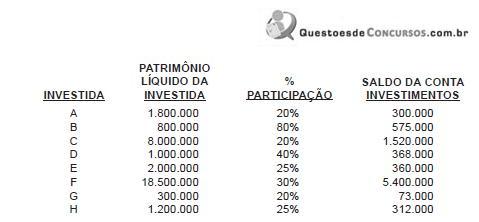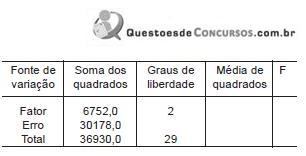Questões de Concurso
Comentadas para analista do banco central - área 3
Foram encontradas 41 questões
Resolva questões gratuitamente!
Junte-se a mais de 4 milhões de concurseiros!
I - o crime praticado foi de gestão fraudulenta;
II - a hipótese descrita não está tipificada na lei especial;
III - há responsabilidade penal objetiva do autor;
IV - o delito caracterizado foi de divulgação de informação falsa;
V - o crime em tela somente pode ocorrer mediante apresentação de queixa.
É(São) correta(s) APENAS a(s) afirmação(ões)

Qual o resultado líquido da Equivalência Patrimonial, em reais, destacados os ganhos e as perdas?


Analisando a tabela ANOVA acima, considere as conclusões a seguir.

É correto APENAS o que se conclui em
By Jonathan Weisman Washington Post Staff Writer Friday, November 4, 2005; A01
The Senate approved sweeping deficit-reduction legislation last night that would save about $35 billion over the next five years by cutting federal spending on prescription drugs, agriculture supports and student loans, while clamping down on fraud in the Medicaid program. The measure would also open Alaska's Arctic National Wildlife Refuge to oil drilling, a long-sought goal of the oil industry that took a major step forward after years of political struggle. A bipartisan effort to strip the drilling provision narrowly failed. The Senate bill, which passed 52 to 47, is the first in nearly a decade to tackle the growth of entitlement spending, the part of the federal budget that rises automatically based on set formulas and population changes. It would shave payments to some farmers by 2.5 percent, while eliminating a major cotton support program and trimming agriculture conservation spending. A proposal to limit payments to rich farmers failed yesterday. The measure passed largely along party lines, with only two Democrats voting for it and five Republicans voting against it. Yesterday's action is part of an effort by congressional Republicans to demonstrate fiscal discipline after widespread complaints of profligate spending on Capitol Hill. many Democrats and some moderate Republicans are concerned that the effort may go too far, prominent Republicans in the Senate and House said the cuts were necessary to slow the rate of spending and control a deficit projected to total $314 billion by the end of the fiscal year. During a speech yesterday, former House majority leader Tom Delay (R-Tex) repeatedly apologized for excessive spending by Congress, including recent highway legislation that was with lawmakers’ pet projects. After noting that House Republicans have voted to cut taxes every year since winning the majority in 1994, DeLay acknowledged, “Our record on spending has not been as consistent, ______ .”
(Adapted from washingtonpost.com)
Na questão, a palavra que preenche corretamente a lacuna é
By Jonathan Weisman Washington Post Staff Writer Friday, November 4, 2005; A01
The Senate approved sweeping deficit-reduction legislation last night that would save about $35 billion over the next five years by cutting federal spending on prescription drugs, agriculture supports and student loans, while clamping down on fraud in the Medicaid program. The measure would also open Alaska's Arctic National Wildlife Refuge to oil drilling, a long-sought goal of the oil industry that took a major step forward after years of political struggle. A bipartisan effort to strip the drilling provision narrowly failed. The Senate bill, which passed 52 to 47, is the first in nearly a decade to tackle the growth of entitlement spending, the part of the federal budget that rises automatically based on set formulas and population changes. It would shave payments to some farmers by 2.5 percent, while eliminating a major cotton support program and trimming agriculture conservation spending. A proposal to limit payments to rich farmers failed yesterday. The measure passed largely along party lines, with only two Democrats voting for it and five Republicans voting against it. Yesterday's action is part of an effort by congressional Republicans to demonstrate fiscal discipline after widespread complaints of profligate spending on Capitol Hill. many Democrats and some moderate Republicans are concerned that the effort may go too far, prominent Republicans in the Senate and House said the cuts were necessary to slow the rate of spending and control a deficit projected to total $314 billion by the end of the fiscal year. During a speech yesterday, former House majority leader Tom Delay (R-Tex) repeatedly apologized for excessive spending by Congress, including recent highway legislation that was _______ with lawmakers’ pet projects. After noting that House Republicans have voted to cut taxes every year since winning the majority in 1994, DeLay acknowledged, “Our record on spending has not been as consistent, .”
(Adapted from washingtonpost.com) Na questão, a palavra que preenche corretamente a lacuna é
By Jonathan Weisman Washington Post Staff Writer Friday, November 4, 2005; A01
The Senate approved sweeping deficit-reduction legislation last night that would save about $35 billion over the next five years by cutting federal spending on prescription drugs, agriculture supports and student loans, while clamping down on fraud in the Medicaid program. The measure would also open Alaska's Arctic National Wildlife Refuge to oil drilling, a long-sought goal of the oil industry that took a major step forward after years of political struggle. A bipartisan effort to strip the drilling provision narrowly failed. The Senate bill, which passed 52 to 47, is the first in nearly a decade to tackle the growth of entitlement spending, the part of the federal budget that rises automatically based on set formulas and population changes. It would shave payments to some farmers by 2.5 percent, while eliminating a major cotton support program and trimming agriculture conservation spending. A proposal to limit payments to rich farmers failed yesterday. The measure passed largely along party lines, with only two Democrats voting for it and five Republicans voting against it. Yesterday's action is part of an effort by congressional Republicans to demonstrate fiscal discipline after widespread complaints of profligate spending on Capitol Hill. ______ many Democrats and some moderate Republicans are concerned that the effort may go too far, prominent Republicans in the Senate and House said the cuts were necessary to slow the rate of spending and control a deficit projected to total $314 billion by the end of the fiscal year. During a speech yesterday, former House majority leader Tom Delay (R-Tex) repeatedly apologized for excessive spending by Congress, including recent highway legislation that was with lawmakers’ pet projects. After noting that House Republicans have voted to cut taxes every year since winning the majority in 1994, DeLay acknowledged, “Our record on spending has not been as consistent, .”
(Adapted from washingtonpost.com)
Na questão, a palavra que preenche corretamente a lacuna é
I. Num lemons market sempre se concretizam transações, até mesmo quando os compradores estejam dispostos a pagar, por um bem de boa qualidade, um preço superior àquele que os vendedores estejam dispostos a negociá-lo.
II. O fato do mercado de arte ter proporções reduzidas pode ser explicado, entre outras razões, pelo risco que consumidores comuns correm de adquirir uma obra falsa pelo preço de uma verdadeira.
III. A existência de franquias elevadas para seguros de automóveis é justificada pelo fato de as seguradores não poderem verificar individualmente o cuidado que os segurados tomam com seus veículos.
IV. A garantia oferecida pelas concessionárias de automóveis, ao comercializarem carros usados, bem como sua reputação no mercado, são sinais utilizados para demonstrar que esses produtos têm qualidade acima da média esperada pelo comprador.
V. A relação agente-principal é aquela em que uma pessoa (agente) atua como preposto de outra (principal), recebendo para isso uma remuneração; esse tipo de relação é ilustrativa do moral hazard, já que nem sempre o principal consegue monitorar integralmente o comportamento dos agentes.
É INCORRETO o que consta APENAS em
CT 40 + 20q + 5q2
onde q é a quantidade produzida por cada empresa.
A curva de demanda de mercado para o bem em questão é dada pela seguinte função:
P = 40 - 1/60 Q
Sendo:
P = preço de mercado Q = quantidade demandada no mercado
O preço de equilíbrio nesse mercado será: